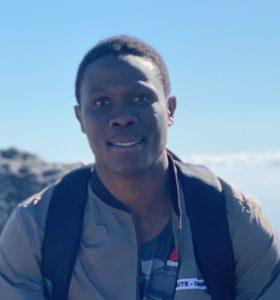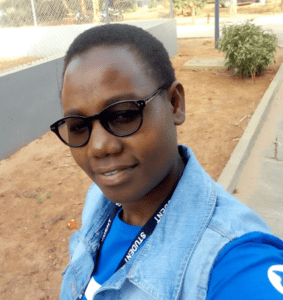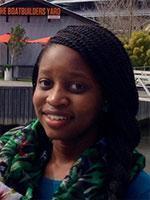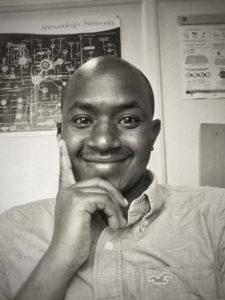November 2020
This month we conducted a special video interview of Immunopaedia Ambassadors Naffesa Al Sheikh, Kenneth Omollo and Vicky Gent on their experiences writing COVID-19 immunology summaries and how they research activities were affected by the COVID-19 pandemic.
How were your research activities affected by the COVID-19 pandemic?
What motivated you to write COVID-19 immunology summaries, and what advice do you have for your fellow junior scientists?
Did you pick up any new hobbies during the pandemic?
COVID-19 Immunology Summaries:
- Cigarette smoke triggers increased ACE-2 expression in the lung
- Respiratory disease and viral shedding in rhesus macaques inoculated with SARS-CoV-2
- Can neonates born to mothers with COVID-19 acquire maternal infection ?
- Detection of SARS-CoV-2 nAbs in cats
- Treating COVID-19 with immunoglobulins, should we be cautious?
- Potent neutralizing antibodies isolated from COVID-19 patients
- Tissue tolerance in COVID-19
- Are blood groups associated with severe COVID-19 respiratory failure?
- Getting to the guts of SARS-CoV-2 infection
- Exhaustion of antiviral NK and CD8 T cells in SARS-CoV-2 infection
- Faecal shedding of SARS-CoV-2
- Could blood groups influence COVID-19 disease severity?
- The Origin of SARS-CoV-2
- Read more
October 2020
This month we conducted a special video interview of Immuno-Algeria course participants Ikram Mezghiche, Khaoula Attia and Sawsan Feki. The Immuno-Algeria course was scheduled to take place in June 2020. However, due to COVID-19 travel restrictions, the face to face meeting was cancelled and an online course was developed instead. Ikram and Khaoula were selected by the Immuno-Algeria organising committee to assist with developing the online pre-course material. We then asked the 3 of them to write short summaries of the course proceedings for others to get an overview of what was taught at the course (see below). The interview covers 3 main topics:
What were your experiences taking part in our first online course?
What were your experiences being rapporteurs for the course?
How has your research and personal lives been affected by the COVID-19 pandemic ?
Immuno-Algeria Rapports.
- Immuno-Algeria 2020: Introduction to allergy and molecular diagnosis
- Immuno-Algeria 2020: Cellular components of the allergic response
- Immuno-Algeria: IgE & its receptors as a pharmacological targets
- Immuno-Algeria: Allergic activity of IgE binding molecules
- Immuno-Algeria: Microbial dysfunction & allergy
- Immuno-Algeria: Non-invasive allergy biomarkers & next-gen immunotherapies
- Immuno-Algeria: Drug hypersensitivity in TB/HIV endemic settings
August 2020
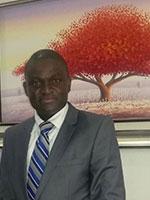 Emmanuel Tumininu Obishakin from Nigeria is our ambassador of the month. Emmanuel is a Postdoctoral Researcher/Reaching Assistant at Ghent University in South Korea. During 2020, Emmanuel contributed to immunopaedia content by conducting two interview of prominent researchers Prof Magez and Prof Uzonna.
Emmanuel Tumininu Obishakin from Nigeria is our ambassador of the month. Emmanuel is a Postdoctoral Researcher/Reaching Assistant at Ghent University in South Korea. During 2020, Emmanuel contributed to immunopaedia content by conducting two interview of prominent researchers Prof Magez and Prof Uzonna.
Position: Assistant Director
Research Institute: National Veterinary Research Institute, Vom, Plateau State Nigeria (Current address: Postdoctoral researcher/teaching assistant, Biomedical Research Centre, Ghent University Global Campus, Songdo, Incheon, South Korea
Research interests: Molecular diagnosis and immunology of infectious diseases
Why I love immunology: I really love immunology, especially the immunology of pathogenic organisms because it explains how the host’s body interacts with invading pathogens. Although my first touch of immunology was brief at the veterinary school, during my PhD, I had a privilege of studying some immune responses of the host during an infection and up until now, it fascinates me! In addition, immunology cuts across infectious diseases. For instance, my understanding of immunology helps me to easily grasp the immune response details of other diseases such as COVID-19. In fact, the solution to most infectious diseases lies with immunology!
If I wasn’t an immunologist I would be: A molecular biologists for infectious diseases. This is because, there are still more things to learn about the infectious diseases in my country.
Tips for young people who want to enter the field of immunology: 1) The field of immunology needs more people than ever because of COVID-19 and the world’s expectation for a vaccine that works. To succeed as a young person who is interested in immunology, have a mentor, be focused, be ready to study because your mentor cannot tell you everything, do not give up, know that immunology has so much detail, so many branches and eventually, you have to focus on your field of interest. Look for opportunities to learn more, in immunology you will keep learning. I consider myself to still be a student of immunology…
Recent publications: Radwanska M., Nguyen H.T.T., Moon S., Obishakin E., Magez S. (2020) Establishment of a Standardized Vaccine Protocol for the Analysis of Protective Immune Responses During Experimental Trypanosome Infections in Mice. In: Michels P., Ginger M., Zilberstein D. (eds) Trypanosomatids. Methods in Molecular Biology, vol 2116. Humana, New York, NY.
Magez S, Pinto J, Obishakin E, Radwanska M. Infections with extracellular trypanosomes require control by efficient innate immune mechanisms and can result in the destruction of the mammalian humoral immune system. Frontiers in Immunology. 2020;11:382.
What being an Immunopaedia Ambassador means to me: To me, it means an opportunity to meet greater minds in this field and a way to contribute in my little way…
How I have contributed to Immunopaedia so far: I have conducted two interviews for two immunology Professors as immunologists of the month and I hope to contribute more.
How can you get in touch with me ? LinkedIn & ResearchGate
July 2020
Caleb Nwongbouwoh Muefong from Cameroon is our ambassador of the month. Caleb is currently pursuing a doctoral degree at MRC Unit The Gambia at LSHTM, The Gambia. He joined immunopaedia in the last quarter of 2019, and has made valuable contributions by interviewing Prof. Michele A. Miller.
Position: Doctoral student
Research Institute: Medical Research Council Unit The Gambia at London School of Hygiene and Tropical Medicine
Research interests: Public health, Chronic inflammatory diseases, Immuno-modulation.
Why I love immunology: To me, immunology is at the crosswalk of of Biomedical research and it’s understanding enhances our capacity to answer questions/challenges faced by other fields.
Tips for young people who want to enter the field of immunology: 1) Take time to figure out what field and type of research you would like to conduct. (2) Try to gain some hands-on research experience early on. (3) Find senior researchers with whom you are comfortable working with. (4) Be nice and you’ll probably attract nice people; science is all about group work and communication.
What being an Immunopaedia Ambassador means to me: Playing my part as a useful member of a community which eases the sharing of valuable information with the world.
How I have contributed to Immunopaedia so far: I have interviewed an important scientist working in the field of wild life TB research and looking forward to opportunities of doing more.
How can you get in touch with me ? LinkedIn, Twitter & ResearchGate
March 2020
Eunice Wavinya Kiamba from Kenya, currently pursuing based in The Gambia, is our ambassador of the month. Eunice is a PhD student in immunology researching on understanding early innate and adaptive immune responses associated with HPV vaccination and how these responses influence the generation of the protective antibody mediated immunity. She joined the Immunopaedia team in March 2019 and has made valuable contributions by writing articles and showcasing Immunopaedia.
Position: Doctoral student
Research Institute: Medical Research Council Unit The Gambia at London School of Hygiene and Tropical Medicine
Research interests: I am passionate about vaccine immunology particularly antibody mediated immunity as well as the early innate and cellular mechanisms that drive the generation of sustainable antibody responses for long-term protection. I have developed and still learning relevant molecular and immunological skills applicable in solving immunological problems around relevant diseases in Sub-Saharan Africa where disease burden is highest. My current PhD project is aimed at understanding early innate, plasma cell, memory B cells and T follicular helper cell responses to HPV vaccination and how these responses influence the generation of the excellent serological protection that is usually observed from current HPV vaccines.
Recent publications: Plasmodium PHISTc (PF3D7_0936800) is a target of naturally acquired immunity to malaria (manuscript under revision).
Why I love immunology: Immunology helps us understand how the body functions in health and in disease, and this has helped in design and development of various life-saving vaccines and therapies. As an essential part of healthcare research, there are lots of un-unanswered immunological questions around various diseases and vaccines hence lots of more opportunities for us to learn in this field. At a time when many vaccines have been empirically developed, it is important to understand specific immunity to various antigens as this would facilitate novel approaches in vaccine design and development of more effective vaccines.
If I wasn’t an immunologist I would be: A molecular biologist. Immunology and molecular biology are two very necessary disciplines in health research today and especially in the wake of current technological advancements where we are able to integrate genetic and various other types of data to deduce important messages in health research.
Tips for young people who want to enter the field of immunology: If you are interested in Immunology, it is such an incredibly exciting and broad field meaning there is a lot that people can learn and do in this field. It is important to bear in mind that, just like any other research field, everything does not always happen smoothly and part of the learning process is to be able to address challenges as we encounter them.
What being an Immunopaedia Ambassador means to me: This to me means an opportunity to make more people aware of the Immunopaedia online platform and its role in disseminating immunological knowledge in both clinical and basic healthcare research.
How I have contributed to Immunopaedia so far: I became an Immunopaedia ambassador in March 2019 having attended IDA 2018 in Cape Town in October 2018. Since then, I have contributed to immunopaedia by creating awareness in my current host institution where I gave an Immunopaedia talk on 2019 in the Vaccines and Immunity Theme meeting and people were very happy to learn about it. I have also submitted content for Immunopaedia publication two times, a highlight on the Vaccinology in Africa course that was organized by University of Oxford in collaboration with MRC Unit the Gambia at LSHTM in Gambia and an interview for the October 2019 Immunologist of the month, Professor Jayne Sutherland. I have also been sharing relevant Immunopaedia opportunities within the Unit so those interested can apply. I plan to contribute towards this noble course more in this year as I have opportunities to attend various International conferences from where I can highlight conference contents and interview various Immunologists for publication on the Immunopaedia platform.
How can you get in touch with me ? LinkedIn & Twitter
The Immunopaedia Ambassador program is a network of early-career immunologists -Graduate students, Post-Docs and Junior Principal Investigators- who work to spread the word about our website in their home countries and institutions. The program started in 2017, and every month since we have recognised ambassadors who have made valuable contributions to the website. This month we are highlighting contributions of our top 5 Ambassadors.
Thandeka Moyo, by far is our top contributing Ambassador. Thandeka has conducted multiple interviews and written many articles for Immunopaedia. From 2016-2017, she was a member of the Immunopaedia Communications team, and was responsible for coordinating the Immunopaeida Ambassador Program.
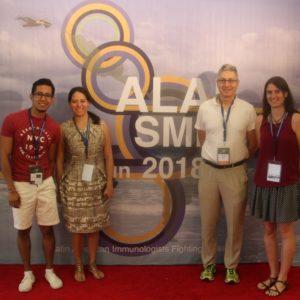
(From left to right) Juan Carlos Balandrán, Jennifer Enciso, Dr. Clive Gray and Cristina Artaza at the ALAI-SMI Congress.
Jennifer Enciso Garcia, soon to be PhD Graduate from Mexico, was our September 2017 Ambassador of the month. During her tenure, she has conducted multiple interviews of researchers who have presented at conferences in Latin America, as well as assisted with the organisation of the Immuno-Informatics-Mexico. Jennifer has worked closely with Juan Carlos Balandran Jaurez, also from Mexico and October 2018 Ambassador of the Month. Juan has conducted multiple interviews and written news articles for Immunopaedia. Video Interviews conducted by Jennifer and Juan can be watched on our Youtube Page: ALAI/SMI Immunopaedia Interviews. Cristina Artaza Irigaray, from Spain based in Mexico, was one of the first ambassadors to present a Poster on Immunopaedia at an international conference (ALAI-SMI-Congress in May 2018). During this conference, she conducted audio interviews and wrote news articles summarising key highlights of the meeting. Cristina was our December 2017 Ambassador of the Month.
Last but not least is Kenneth Omollo, from Kenya (February 2018 Ambassador of the month). He has written news articles on HIV and TB immunology, and conducted a written interview of prominent Immunologist Lyle McKinnon. Other top contributing Ambassadors are Amy Mónaco, Katrhin Held, Maria Bernadette Madel and Dana Manuela Savulescu.
These individuals are not the only Ambassadors who have contributed to Immunopaedia. We would like to thank those who have contributed but are not highlighted in this article. Your commitment and contributions are much appreciated.






